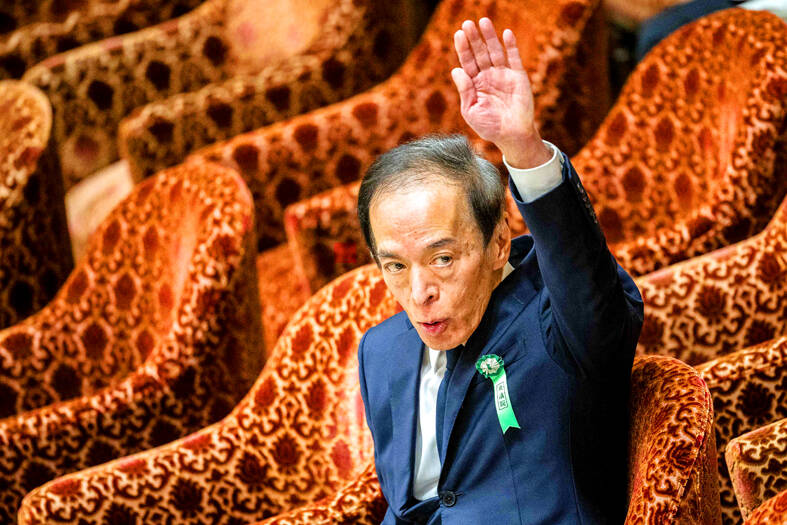The Bank of Japan (BOJ) left its ultra-easy monetary policy unchanged in its last meeting before Governor Haruhiko Kuroda steps down and is replaced by economics professor Kazuo Ueda.
While most analysts expected the Japanese central bank to stay the course in Kuroda’s final policy decision, some had speculated about a surprise tweak.
The bank left its long-standing negative interest rate in place and made no further adjustments to the band, in which rates for 10-year government bonds fluctuate.

Photo: AFP
The decision came shortly after Japan’s parliament approved Ueda as the BOJ’s next governor, paving the way for the 71-year-old to take over next month.
In recent months, the BOJ has steadfastly resisted tightening, even other developed economies have hiked rates to tackle inflation — a policy gap that has caused the yen to tumble against the US dollar.
Kuroda has insisted that the bank’s long-standing goal of sustained 2 percent inflation — considered necessary to turbocharge the world’s third-largest economy — has not yet been achieved.
Consumer prices hit 4.2 percent in January, driven by factors including higher fuel costs, but Kuroda has argued the rises are the result of temporary factors like the war in Ukraine.
He wants to see evidence of more sustained rises, including salary increases, before adjusting policy.
Ueda told lawmakers last month that he saw the “continuation of monetary easing as appropriate,” warning of uncertainty in financial markets and the global economy.
Current factors driving higher prices “will likely ebb in the future, and inflation in consumer prices will likely drop below 2 percent,” he said.
Ueda has a doctorate in economics from the Massachusetts Institute of Technology and is seen as a good communicator who prefers cautious reflection over abrupt action.
Kuroda, 78, is to step down at the end of his second term on April 8, after a tenure defined by his signature “bazooka” easy-money policies.
Since he took charge, the central bank’s assets have quadrupled, surpassing GDP, in a first for a G7 nation.
Analysts said Ueda would face a tough job in navigating a way forward for the BOJ, whose easy-money policies are viewed as unsustainable in the long term.
“While a policy change may not come any time soon, Japanese companies have already been preparing for an eventual shift, as shown by the high level of net cash they hold,” SuMi TRUST senior economist Hiroyuki Ueno said.
Santa Zvaigzne-Sproge, head of investment advice at Conotoxia, said inflation fueled by the strong dollar and supply chain problems linked to the COVID-19 pandemic and the Ukraine war would make sudden rate hikes a risky prospect for the bank.
“The BOJ has no control over the appreciation of the US dollar and supply shortages, as these are external factors,” she said.
“This means that raising interest rates at this time would not only have any noticeable effect on inflation, but would also put additional pressure on Japanese companies,” she said.

MULTIFACETED: A task force has analyzed possible scenarios and created responses to assist domestic industries in dealing with US tariffs, the economics minister said The Executive Yuan is tomorrow to announce countermeasures to US President Donald Trump’s planned reciprocal tariffs, although the details of the plan would not be made public until Monday next week, Minister of Economic Affairs J.W. Kuo (郭智輝) said yesterday. The Cabinet established an economic and trade task force in November last year to deal with US trade and tariff related issues, Kuo told reporters outside the legislature in Taipei. The task force has been analyzing and evaluating all kinds of scenarios to identify suitable responses and determine how best to assist domestic industries in managing the effects of Trump’s tariffs, he

TIGHT-LIPPED: UMC said it had no merger plans at the moment, after Nikkei Asia reported that the firm and GlobalFoundries were considering restarting merger talks United Microelectronics Corp (UMC, 聯電), the world’s No. 4 contract chipmaker, yesterday launched a new US$5 billion 12-inch chip factory in Singapore as part of its latest effort to diversify its manufacturing footprint amid growing geopolitical risks. The new factory, adjacent to UMC’s existing Singapore fab in the Pasir Res Wafer Fab Park, is scheduled to enter volume production next year, utilizing mature 22-nanometer and 28-nanometer process technologies, UMC said in a statement. The company plans to invest US$5 billion during the first phase of the new fab, which would have an installed capacity of 30,000 12-inch wafers per month, it said. The

Taiwan’s official purchasing managers’ index (PMI) last month rose 0.2 percentage points to 54.2, in a second consecutive month of expansion, thanks to front-loading demand intended to avoid potential US tariff hikes, the Chung-Hua Institution for Economic Research (CIER, 中華經濟研究院) said yesterday. While short-term demand appeared robust, uncertainties rose due to US President Donald Trump’s unpredictable trade policy, CIER president Lien Hsien-ming (連賢明) told a news conference in Taipei. Taiwan’s economy this year would be characterized by high-level fluctuations and the volatility would be wilder than most expect, Lien said Demand for electronics, particularly semiconductors, continues to benefit from US technology giants’ effort

‘SWASTICAR’: Tesla CEO Elon Musk’s close association with Donald Trump has prompted opponents to brand him a ‘Nazi’ and resulted in a dramatic drop in sales Demonstrators descended on Tesla Inc dealerships across the US, and in Europe and Canada on Saturday to protest company chief Elon Musk, who has amassed extraordinary power as a top adviser to US President Donald Trump. Waving signs with messages such as “Musk is stealing our money” and “Reclaim our country,” the protests largely took place peacefully following fiery episodes of vandalism on Tesla vehicles, dealerships and other facilities in recent weeks that US officials have denounced as terrorism. Hundreds rallied on Saturday outside the Tesla dealership in Manhattan. Some blasted Musk, the world’s richest man, while others demanded the shuttering of his